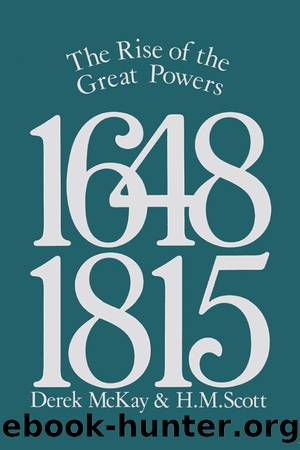The Rise of the Great Powers 1648 - 1815 (The Modern European State System) by Derek Mckay & H.M. Scott

Author:Derek Mckay & H.M. Scott [Mckay, Derek]
Language: eng
Format: azw3
ISBN: 9781317872832
Publisher: Taylor and Francis
Published: 2014-09-19T00:00:00+00:00
THE SEVEN YEARS WAR IN EUROPE, 1756â1763
Frederick IIâs invasion of Saxony (29 August 1756) had been a victory for military over diplomatic considerations. From a purely military point of view it was a considerable success. The Saxon forces were surrounded and forced to surrender (October 1756) and the Elector of Saxony was permitted to retire to his Polish territories, where he remained until the end of the war. Saxony was treated as a Prussian province throughout the Seven Years War, and suffered increasingly brutal exploitation. The considerable strategic threat of an Austrian invasion through Saxon territory (the Prussian capital, Berlin, was only some 30 miles from the border) had apparently been removed. From a diplomatic point of view, however, Frederickâs attack on Saxony was far less successful, since it completed the anti-Prussian coalition Kaunitz wanted. The enmity of Russia and France had previously been one of Frederickâs most important securities; the Prussian invasion of Saxony gave the two states a common interest which they would otherwise have lacked and inaugurated a period of political partnership. In the autumn of 1756, the most important component in Kaunitzâs intended coalition was his defensive alliance with France (First treaty of Versailles, 1 May 1756). Frederickâs aggression not only made this treaty operative: it brought France into the struggle, and was also used by Kaunitz to complete the anti-Prussian coalition. In January 1757 Russia acceded to the First treaty of Versailles and the following month concluded a new, offensive alliance with Austria against Prussia. The Austrian chancellorâs skilful diplomacy then produced the Second treaty of Versailles (1 May 1757), an offensive alliance between Austria and France. This decisive agreement transformed Franceâs role in the continental war. There was, however, no formal Russo-French alliance: Russia was united to France only by virtue of their respective treaties with Austria, and this was to prove a significant weakness in Kaunitzâs coalition. The anti-Prussian league was completed by the adherence of Sweden (March 1757) and by the dispatch of contingents of soldiers from the Empire.
The military and economic resources of his enemies were considerable and Frederick II appeared to be facing overwhelming odds. In 1756 the strength of the Prussian army was around 143,000 men; Austria alone had some 177,000 men under arms. Kaunitz was never able, however, to use the apparently massive superiority of the anti-Prussian coalition to achieve a decisive victory. The explanation for this is largely to be found in the nature of the coalition, irresistible on paper but grievously weakened in practice by the absence of a unifying common purpose. Swedenâs contribution was limited to some desultory manoeuvring in West Pomerania, while the contingents from the Empire were of limited military value. The main burden of the war fell on the three principals, Austria, Russia and France; but at different times their military efforts were reduced by other factors.
The basic problem was that the three allies each saw the war in a different light, and no amount of diplomacy was able to disguise this fundamental weakness.
Download
This site does not store any files on its server. We only index and link to content provided by other sites. Please contact the content providers to delete copyright contents if any and email us, we'll remove relevant links or contents immediately.
| Belgium | France |
| Germany | Great Britain |
| Greenland | Italy |
| Netherlands | Romania |
| Scandinavia |
Room 212 by Kate Stewart(5093)
The Crown by Robert Lacey(4793)
Endurance: Shackleton's Incredible Voyage by Alfred Lansing(4744)
The Iron Duke by The Iron Duke(4340)
The Rape of Nanking by Iris Chang(4191)
Joan of Arc by Mary Gordon(4082)
Killing England by Bill O'Reilly(3987)
Say Nothing by Patrick Radden Keefe(3966)
I'll Give You the Sun by Jandy Nelson(3421)
Shadow of Night by Deborah Harkness(3344)
Hitler's Monsters by Eric Kurlander(3321)
Mary, Queen of Scots, and the Murder of Lord Darnley by Alison Weir(3192)
Blood and Sand by Alex Von Tunzelmann(3181)
Eleanor & Park by Rainbow Rowell(3143)
Darkest Hour by Anthony McCarten(3113)
Margaret Thatcher: The Autobiography by Thatcher Margaret(3069)
Book of Life by Deborah Harkness(2914)
Red Famine: Stalin's War on Ukraine by Anne Applebaum(2912)
The One Memory of Flora Banks by Emily Barr(2850)
